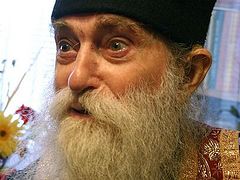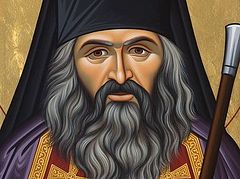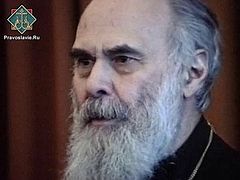In 2000, His Holiness Patriarch Alexei II delivered his famous speech on “young elders” (mladostarchestvo). At that time this distorted practice of spiritual guidance was considered phenomenon of church life in the post-Soviet space, where after decades of state-imposed atheism many Orthodox traditions were disrupted and due to an acute shortage of clergy, people who were often unprepared for priestly ministry were ordained in large numbers. But unfortunately, this phenomenon is apparently universal, something which is confirmed by the work entitled, “The Phenomenon of ‘Gerondism’”, by Metropolitan Ephymios of Achelóos, which we offer here in translation for our readers.
 The painter: Konstantin Makovsky
The painter: Konstantin Makovsky
Introduction
In the tradition of Orthodox spirituality and the framework of ascetic monasticism, spiritual fatherhood appeared, flourished and was formed as an institution in the form of the bond between a monastic elder and his disciple—a young monk under formation—in the sense of the latter’s total obedience to the former. Such holy and great desert instructors as Ephymius the Great, Sabbas the Sanctified, John Damascene and a host of other celebrated Church Fathers, made their first steps in the ascetic monastic life as students of prominent elders of the age. Thus, in the first centuries of Christianity, as a result of the flourishing of the institution of spiritual fatherhood, multitudes of young people flocked to great holy desert-dwellers, and important centers of monastic life were established in Egypt and Palestine. Apart from this, spreading spiritual fatherhood beyond monasteries soon contributed to the fact that numerous faithful laypeople began to flock to various monastic centers where, in addition to attending church services, they had a chance to meet and speak with monastic elders. The institution of pilgrimage that resulted from that movement was another fruit of spiritual fatherhood.
Among the factors that largely contributed to the enormous influence and popularity of spiritual fatherhood was the fact that some ascetics possessed one of the gifts (charismas) of the Holy Spirit—the gift of clairvoyance.
The gift of clairvoyance, or foresight, is a special, powerful effect of the Holy Spirit bestowed on some monks. Through the work of this charisma they are able to have profound insight into the depths of human consciousness, see people’s thoughts and feelings, discern their physical and mental diseases or disorders in the natural environment, and, lastly, see the events and states that occur within a certain period of time or are to occur in the future across our planet. This rare gift of the Holy Spirit and its impressive scale naturally astounded the common people; so the great and small, insignificant and powerful, sick and healthy, obscure and famous hastened to meet and speak with the individuals who possessed such a great gift. Fathers with the charismas of clairvoyance and prophecy could be found in all the Orthodox Churches.
However, this phenomenon had its “side-effect” as well: Many clerics, both of the married priesthood in the world and in monasteries, automatically began to identify themselves as spiritual fathers and were proclaimed as such by their acquaintances, friends, compatriots, and so on. For this reason many speak of the distorted practice of eldership, or “gerondism”, which has become an attribute of the religious life of many modern Greeks.
Metropolitan Simeon (Koutsis) of New Smyrna writes:
“Quite a few clerics have begun to thirst for the fame of gerondas. Very young, immature as personalities, inexperienced as pastors, they have never really been novices or disciples of any experienced spiritual father; but they pose as (or cunningly get those around them to present them as) new Barsanuphuses, as new charismatic elders. As the Lord said of them, they compass sea and land to make one proselyte (Mt. 23:15).”
This trend is extremely dangerous for laypeople, so we need to have an Orthodox theological and critical commentary on this phenomenon.
The components of the phenomenon of “gerondism”
The most characteristic components of the phenomenon under consideration are as follows.
1. A total bond.
On closer acquaintance with a priest or spiritual father laypeople often establish a total bond with him. This usually takes place if they meet real spiritual fathers, and especially when these possess the spectacular gift of clairvoyance. But, unfortunately, the same phenomenon can also be observed in situations when immature, unprepared and theologically illiterate clerics claim to have the God-given gift of spiritual fatherhood, which in reality they don’t possess. As Protopresbyter George Metallinos writes:
“It is regrettable that there are people who receive the title ‘geronda’ and behave like gerondas, whereas they possess no spiritual gifts—that is, they do not really have experience in spiritual life. And they very often cause the spiritual death of those in their care.”
The worst thing about this is that some unworthy hieromonks, who indeed take advantage of their rank, claim to possess this subtle gift. Such individuals, taking advantage of the charm and charisma of spiritual fatherhood that have a great impact on laypeople, not the least on women, form such an absolute bond with them that very often leads to excesses and inappropriate relationships.
“Constraint and spiritual violence have no place in the relationship between a spiritual father and his spiritual children,” Metropolitan Kallistos (Ware) of Diokleia writes. “Due obedience to our spiritual father is not a ‘blind’, but conscious. It does not abolish our personal responsibility either, as that springs from our freedom in Christ … The duty of a spiritual father is not to destroy a person's freedom, but to help him see the truth for himself. He does not strive to oppress a person's personality; only to give him the potential to discover himself, to develop, to mature, and to become what he is in reality... A spiritual father does not impose his own personal ideas and virtues, but helps his student to find his own exclusive calling... In short, he is only an usher of God, and he is duty-bound to lead souls onto God’s path, and not his own.1”
As a rule, faithful men and women who struggle in the world (either voluntarily or through the obtrusive persuasion of their “spiritual fathers”) pledge not to take any actions in their lives without the prior approval, permission or even “blessing” of the “elder”. There is no shortage of examples of this. In some cases, laypeople and the married are obliged or forced to share all the issues that worry them with their “spiritual fathers”—for example, clothes, purchases, travelling, house design and so forth.
According to Metropolitan Simeon: “Such spiritual fathers make people feel guilty, driving them to depression allegedly in the name of demanding blind obedience to the elder. They develop an unhealthy attachment to their own person in these people.”
As a result of an absolute bond with a “geronda” or with “elders”, people who depend on them ultimately become estranged or even fall away from all other forms of church life—for example, the local parish and parishioners, parish priests, and even the local bishop.
2. The absolutization of monastic and ascetic charismas.
The development of Orthodox theology and attention of theological researchers to the nature and functioning of monastic charisma as experienced by great fathers of Orthodox ascetic monastic tradition resulted in an interest in monasticism—more than that, in ascetic monasticism—among faithful laypeople. The most serious consequences of this attention are as follows.
A. Suppressing the Biblical nature of Orthodox teaching.
Sayings and instructions by ascetic fathers rather than words of Christ prevail in both the oral language (church sermons and private pieces of advice) and the written language (church printed output). “The Gospel is unpracticed, the whole of the Scripture is ignored by thee; the Prophets and every word of the Just have lost their power” (from the Great Canon of St. Andrew of Crete) with the view of directing people’s attention to the opinions of various ascetics. In this case we are dealing with a serious theological absurdity because the sayings of ascetics were addressed to their companions and students—these were answers to their specific questions; but the advice of an ascetic or an elder to his disciple or some specific person are not universal and don’t concern all faithful laypeople! Besides, we should discern between ordinary ascetics and holy strugglers for piety.
B. Shifting the Christocentric nature of spiritual fatherhood.
Many spiritual fathers, including married ones, both during confession and in their pastoral activities guide the faithful who struggle in the world according to monastic and ascetic patterns and not according to those of Christ and the apostles.
However, Christ left His “presence” for all the faithful living in the world, I pray not that thou shouldest take them out of the world (Jn. 17:15), and not the monastic way of life which is not intended for everybody but for those to whom it is given (Mt. 19:11).
C. Belittling the missionary dimension of the Church.
The development of Orthodox theology and the excessive emphasis on the importance of ascetic monasticism resulted in belittling of the role of missionary work. The missionary vocation and activity both inside and outside our country (Greece) are condemned as “activism” by some, and at the same time visions of uncreated light is presented by others as… the main distinctive characteristic of Orthodox spirituality.
But Christ defined the following common characteristic for all the faithful, testifying:
Ye are the salt of the earth… Ye are the light of the world (Mt. 5:13-14).
And Apostle Paul specified that there are many charismas and they are multifarious:
Now there are diversities of gifts, but the same Spirit. And there are differences of administrations, but the same Lord. And there are diversities of operations, but it is the same God which worketh all in all (1 Cor. 12:4-6).
D. Division into groups for spiritual guidance.
Some parish priests and married priests who are influenced by monastic currents manage to form a bond between with their parishioners on an exclusive basis, thus creating a separate group within the parish body. In such cases a married parish priest turns into an “elder”, and the parishioners are split up into two or more groups.
E. Making adepts.
There is another erroneous perception of spiritual fatherhood: While it is the institution of spiritual guidance of the faithful with the prospect of gradually setting them free into life in Christ and getting them connected to Christ and the life of the Church, some clerics take advantage of spiritual fatherhood to make adepts who will be fully dependent on them. It is typical of adepts to “get the message”, become the “elder’s” devotees, and “advertise” him. There is even the custom of bragging about one’s spiritual father. Many become haughty because they have a spiritual mentor, mentioning him appropriately and inappropriately, thus exposing their spiritual nakedness and dangerous emotionalism. That is an unhealthy phenomenon. St. Simeon the New Theologian cautions us against this:
“Do not be conceited because many revere your elder and you have numerous students in his name. Rejoice more if your name is engraved in the firmament of obedience” (XX Catechetical Homily).
F. Zeal for the canonization of clerics.
In recent years we have seen an excessive and unacceptable zeal in “spiritual children” and other enthusiasts for the hurried canonization of various clerics, monks, priests, and even laypeople—men and women. Religious publications that circulate all over the country abound in articles and stories by different individuals whose aim is to attach “a halo of holiness” to certain people. Every single day, newly-printed religious books with titles like, “The Life and Exploits of…” (various individuals) mushroom, and in them efforts are made to portray some churchmen as having extraordinary spiritual gifts.
The fashion for the publication of biographies of this kind has increased to such a degree that these books containing the “Lives” of such clerics predominate over the books that cover basic aspects of Orthodox spirituality on the shelves of the bookstores of Christian publishing houses.
G. The fashion for “monastic” bracelets.
Significantly, this pseudo-monastic literature has influenced not only the faithful but also the secular circles of Greek society. An illustrative example of this is the fashion for bracelets that outwardly resemble monastic prayer robes, which are worn by many secular people who have nothing to do with church life and spirituality—adult men and women, young people, children and even babies. This miscomprehension of the meaning of monastic prayer ropes is intolerable.
Monastic prayer ropes are holy objects used for praying and they are associated with hours of prayers and innumerable prostrations, while “monastic” bracelets have nothing to do with the nature and purpose of prayer ropes. Like any amulets, “monastic” bracelets are worn to give protection against diseases.
3. The absolutization of the gift of clairvoyance.
The development of “gerondism” was triggered by an extraordinary spiritual event, namely the appearance of some hieromonks with the gift of clairvoyance in our days. Although this rare gift is known to Church tradition and Orthodox spirituality, its impressive scale has provoked a deep interest among people who are both religious and not religious, both believers and non-believers. Visitors to clairvoyant elders (and there were hundreds of visitors) were particularly impressed by the fact that those elders could inform them about everything: their health, diseases, studies, marriage, and so on. As a result many have begun to flock to those elders not so much for repentance and confession as out of the desire to know what the future holds for them. In that case, aren’t we dealing with the impermissible identification of clairvoyant elders with… all sorts of psychics?
Part 2: Theological critique of the phenomenon. The ethics of the spiritual father and his child




